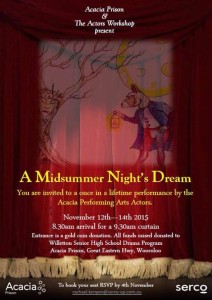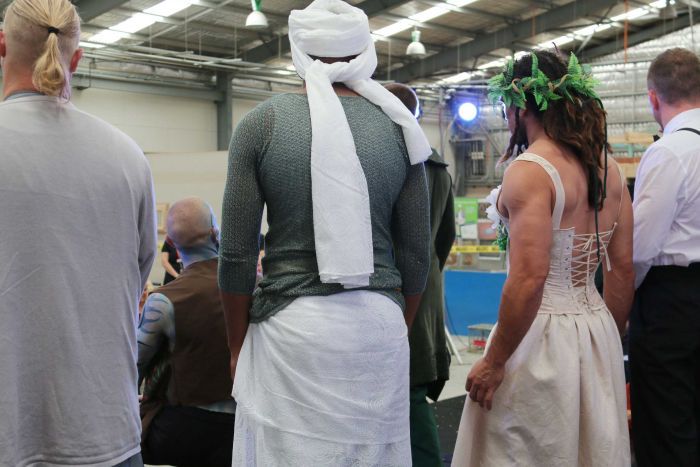When I was taught Shakespeare in school, it was a dull study. While the language is extremely clever and studded with double entendre, for studies you mainly discuss the themes of the plays, not the language itself. Performing it in a play was painful, as we’d never really been shown what Shakespeare was about, and each retelling I’ve seen since barely gets my attention. Terrible, I know.
 Recently I was invited to Acacia Prison to watch prisoners perform A Midsummer Night’s Dream as part of a very unique program headed by The Actor’s Workshop founder, Nichola Renton. I thought “Haven’t they been punished enough?” (LOL)
Recently I was invited to Acacia Prison to watch prisoners perform A Midsummer Night’s Dream as part of a very unique program headed by The Actor’s Workshop founder, Nichola Renton. I thought “Haven’t they been punished enough?” (LOL)
Nichola is an amazing teacher, and I know first-hand – she taught me *ahem* several years ago so I was intrigued by the program and the possibilities that it could hold for the prisoners. Rehabilitation and integration without re-offending is something that is a goal for all prison systems, and world over, it’s woefully left wanting. There are no social aspects of prison life other than mixing with other prisoners – hardly a place for building self-esteem or finding a role model.
Expecting to be in a visitors centre, I was surprised and oddly delighted when we were walked through the prison itself, through the manicured grounds to a large workshop building, where the unmistakable loud exclamations of a vocal warm up could be heard.
As the audience settled, we were asked to close our eyes and take a deep breath to appreciate our surroundings, when we opened them the entire cast of A Midsummer Night’s Dream were onstage. A ragtag bunch of prisoners in fantastic body paint and costumes (Yes, even the female roles) set against a simple backdrop of a forest.
For men who have never acted before, this show was so excellent – the way Shakespeare is meant to be; loose, full of mischief and.. well, all men. They hit every comedic line with relish and an obvious clear understanding of the language which can be difficult for the uninitiated.
The performers did a fantastic job, with some natural talents there that really brought the show to life. The prisoner/performer playing Bottom showed a natural gusto for the role and it was hard to believe this was his first time on stage. I’ve seen some actors I know who have been training for years not able to match his energy and performance. One prisoner/performer effortlessly played two roles; Peter Quince and Oberon. Both very different and integral to the show, he was approached to play Oberon at only 4 days’ notice as the original actor was ill. He’d had some high school experience, again – an almost professional take, and a joy to watch.
The interactions between the ‘young lovers’ was a sight to behold – A large body builder with dreadlocks dressed in a corset as Hermia gave a gentle and considered performance and didn’t balk at all when he embraced his partner. A big ask, seeing as how rough a prison can be on machismo. The young man playing Helena did a stunning job as well, and I was amazed to hear he’d only started learning English in September last year. Now look at him performing Shakespeare! The men playing Demetrius and Lysander were great as the warring contemporaries and seeing them dodge their would be suitors was rather comedic. A great use of music and ‘slow motion’ acting got the whole audience laughing.
The performer playing puck was a cheeky and energetic performer who lit up the stage and I hear is definitely considering a career in theatre after his experience.
The Q &A following the show was interesting. The men with their own words explained to us that the opportunity had created a unifying presence in the prison, between themselves in the group – gaining self-esteem and confidence as well as the prison staff who ended up helping them with costume purchasing and sewing on their days off as well as on shift.
While the program had its sceptics, both with the staff and other prisoners – the results speak for themselves. Some may think that an opportunity to create art while in prison is counter-intuitive to the ‘doing time’ mentality; I can absolutely see that it’s something that should be considered in prisons all over Australia. Prison is an opportunity to change as a person and rehabilitate, not be punished. Punishment doesn’t deter crime, it just fosters resentment to a society that punished them in the first place. The social inclusiveness of theatre and Nichola’s amazingly brave program show that the arts are indeed for everyone. Well done to Nichola Renton, Rachel Kenyon and the Serco staff for facilitating such a fantastic program.

